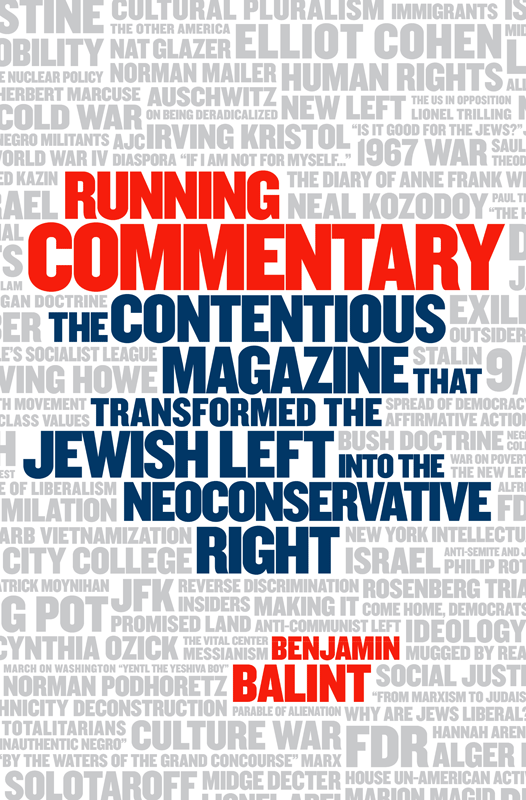Running Commentary:
The Contentious Magazine that Transformed the Jewish Left into the Neoconservative Right (PublicAffairs 2010)
In the years of cultural and political ferment following World War II, a new generation of Jewish- American writers and thinkers arose to make an indelible mark on American culture. Commentary was their magazine; the place where they and other politically sympathetic intellectuals—Hannah Arendt, Saul Bellow, Lionel Trilling, Alfred Kazin, James Baldwin, Bernard Malamud, Philip Roth, Cynthia Ozick and many others—shared new work, explored ideas, and argued with each other.
Founded by the offspring of immigrants, Commentary began life as a voice for the marginalized and a feisty advocate for civil rights and economic justice. But just as American culture moved in its direction, it began—inexplicably to some—to veer right, becoming the voice of neoconservativism and defender of the powerful.
This lively history, based on unprecedented access to the magazine’s archives and dozens of original interviews, provocatively explains that shift while recreating the atmosphere of some of the most exciting decades in American intellectual life.
PRAISE FOR RUNNING COMMENTARY
Lucid, scrupulously documented, and deeply interesting from beginning to end… This is a fascinating account of an important episode in cultural history.
In this eloquent and richly informed book, Benjamin Balint both tells the story of Commentary as a magazine and reads it as an ‘American Talmud’–a great mass of position statements and debates, always passionate and sometimes contradictory, that illuminate the larger intellectual history of America’s Jews.
Benjamin Balint’s fine, well-written book is far more than a history; it is an important, in fact essential contribution to American cultural and political life during the second half of the last century. It is the most important work of its kind published for years.
A provocative, passionate, erudite, and entertaining account of the people and ideas that define the postwar era, transforming Jewish outsiders into American insiders.
Nothing less than a history of the intellectual life of Jews in America as they go from being cultural outsiders to being consummate insiders. It is written with enormous verve, capturing the many colorful characters who created and shaped a publication that was unlike anything the American-Jewish reading community had seen before. This is intellectual history as it should be written: lucid, capacious and unfailingly readable.
An enlightening and sympathetic history of the magazine… Balint is deeply interested and knowledgeable about the religio-cultural side of Commentary’s history.
Beautifully written and richly researched… the best book to date about neoconservatism.
As Benjamin Balint reminds us in Running Commentary, his acutely perceptive account of the magazine’s history, Commentary’s concerns have ranged far beyond its keynote focus on the America-Israel relationship. In its pages arguments over McCarthyism, racial tensions, Vietnam, feminism and many other topics have played out in some of the most brilliantly written and edited prose in American letters… As Balint’s book shows so vividly, Commentary made—and continues to make—an invaluable contribution to the politics and culture of our time.
A model of how to write the history of an intellectual journal.
Running Commentary makes a smart and lively argument that Commentary’s pages reflected a process of Jewish acculturation to America… There is much to gain in reading Balint on the dialectical engagement of Jewish intellectuals with American culture in the twentieth century.
Balint masterfully charts both the history of the little Jewish journal that could and the ensuing rise and fall of conservative intellectualism.
Remarkably thorough, dispassionate, and balanced.
Running Commentary explores its subject with both real familiarity and a critical distance all the more refreshing for being unexpected.
Balint’s riveting history of Commentary magazine is much more than an account of an influential publication. It is a chronicle of what has happened since the Second World War to American society.
Balint provides an impressive roster of writers who departed or were exiled as the magazine moved towards neoconservatism in the early 1970s: Irving Howe, Alfred Kazin, Edward Hoagland, George Steiner, Daniel Bell and many others, including notable fiction writers, such as Bernard Malamud.
Prodigiously talented, learned, and articulate... with a marvelous
flair for anecdote.

